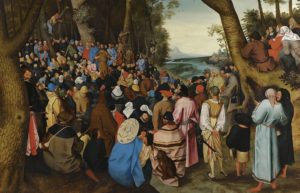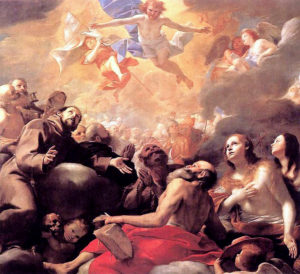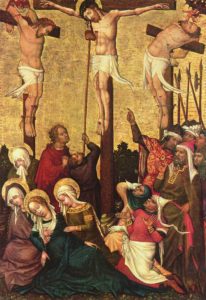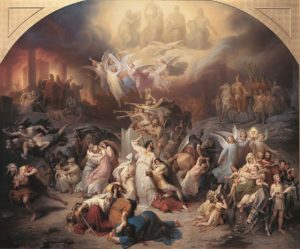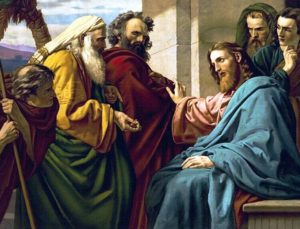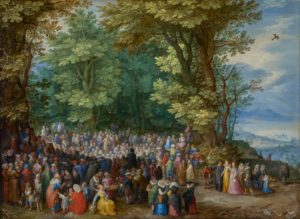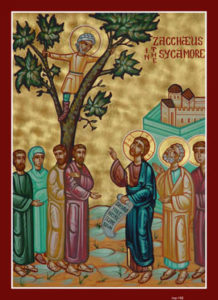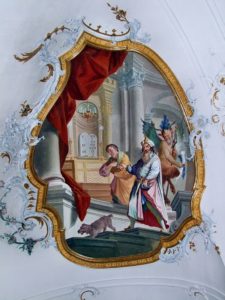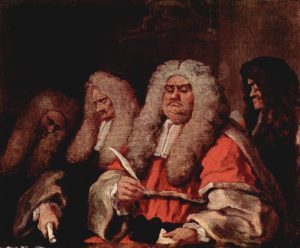Thoughts on Sunday’s Lessons for Dec. 15, 2019
First Reading: Isaiah 35:1-10
When the Messiah comes, when the Kingdom draws near, those days of glory will be filled with righteousness and justice, joy and abundance, with healing and good news for the poor. This is the message that we hear in the readings for the third Sunday of Advent.
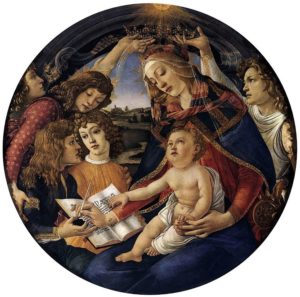
Madonna del Magnificat (Madonna of the Magnificat, 1483), tempera painting on panel by Sandro Botticelli (1445-1510). Uffizi Gallery, Florence. (Click image to enlarge.)
This Sunday the readings shift focus from quiet expectation toward anticipatory joy, a change in pitch that many like to mark by wearing something pink to church. The first reading offers Isaiah’s vision of the people’s return to Jerusalem from exile in Babylon, a homeward journey when the desert itself shall rejoice and blossom with joy and singing.
Psalm: Psalm 146:4-9
In Psalm 146 we sing praise for God our creator – who made heaven, earth, the seas and all that is in them – by seeing the happiness of those who have received God’s assistance. The oppressed receive justice from God; God feeds the hungry, sets prisoners free, cares for strangers, orphans and widows, and gives sight to the blind. All this foreshadows the words that Mary will sing in the Magnificat (which is also available as an alternate Psalm on this Sunday); and we hear them echo again when Jesus describes God’s Kingdom on earth.
Alternate Psalm: Canticle 15 (Luke 1:46-55)
Tradition has come to show us Mary, the mother of Jesus, as a sweet, submissive figure. But the Magnificat, the Song of Mary from Luke’s Gospel, shows a very different Mary, a brave Palestinian teen-ager. Shouting out when she first feels the baby Jesus moving within her, she thanks God for this gift in a song about God’s righteousness and justice. In words that we will later hear again from Jesus, she sings that God has “scattered the proud … brought down the powerful … lifted up the lowly … filled the hungry with good things … and sent the rich away empty.”
Second Reading: James 5:7-10
“Be patient, therefore”? What an odd way to begin a reading! Turn back a page in your New Testament to see what led to this, and you’ll find James excoriating the rich, or more exactly, the selfish rich. “… you rich people, weep and wail for the miseries that are coming to you. … You have laid up treasure for the last days. Listen! The wages of the laborers who mowed your fields, which you kept back by fraud, cry out, and the cries of the harvesters have reached the ears of the Lord of hosts.” But we don’t hear that this Sunday; we begin with the next verses, in which James reminds us to must love each other and be generous with one another, lest we be judged.
Gospel: Matthew 3:1-12
As we move through Matthew’s Gospel in this new Lectionary year, we will hear frequent reminders that Jesus is Messiah, the lord and savior that the prophets foretold. Today we hear a conversation between Jesus and messengers from John the Baptist in prison, asking outright whether Jesus is the Messiah or if they must wait for another. In response Jesus sets out his priorities, which echo Isaiah’s prophecies and his mother’s song: “… the blind receive their sight, the lame walk, the lepers are cleansed, the deaf hear, the dead are raised, and the poor have good news brought to them.”

